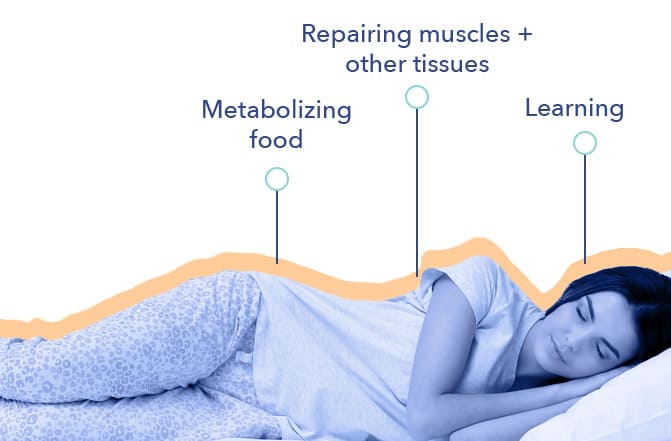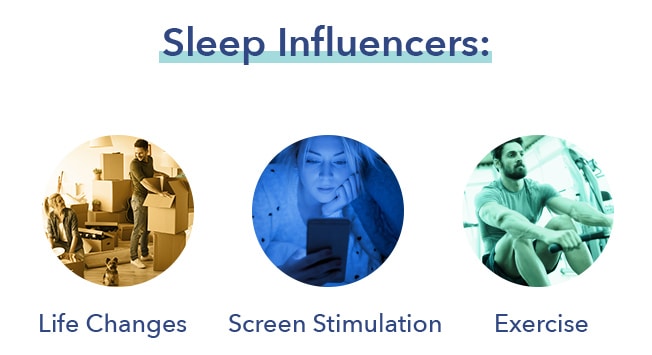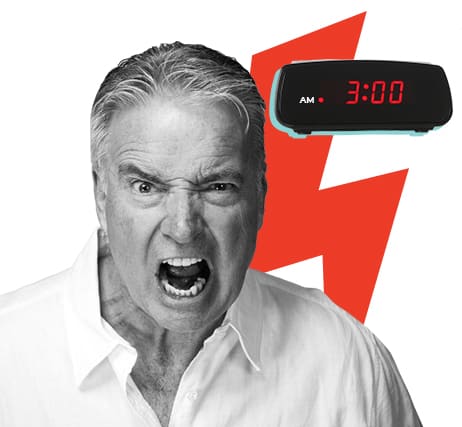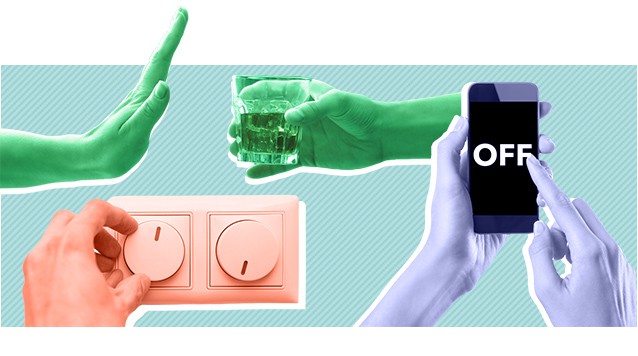Sleep is essential for optimal well-being, and impacts everything from mood to muscle strength to memory. Despite the importance of adequate rest, many people don’t get consistent healthy sleep. Poor sleep can be associated with numerous physical and emotional factors, including stress, medications, medical conditions, and poor diet.
The most common sleep difficulty in the world is insomnia. Transient insomnia lasts less than three months and usually resolves on its own without treatment. Chronic insomnia most often results from negative psychological associations with the bed and sleep, and may persist for years. Fortunately, good sleep habits and non-drug treatments can effectively improve even chronic insomnia, also known as insomnia disorder. So how can we make sure we are getting better sleep?
FAQ
Q: How many people have chronic insomnia? A: Up to 10% of the US population suffers from chronic insomnia, while as many as 30% experience transient insomnia symptoms.Note: The content on Sleepopolis is meant to be informative in nature, but it shouldn’t take the place of medical advice and supervision from a trained professional. If you feel you may be suffering from any sleep disorder or medical condition, please see your healthcare provider immediately.
The Importance of Sleep
Sleep is characterized by a unique state of consciousness, decreased sensory awareness, and lower reactivity to stimuli. All living organisms require sleep to live. The circadian rhythm controls when and how long we sleep, as well as essential functions such as digestion, blood pressure, and body temperature. (1)

Many important bodily processes occur during sleep, including:
- Learning
- Processing and storing memories
- Fighting infection
- Metabolizing food
- Clearing toxins from the brain
- Repairing muscles and other tissues
During sleep, the body creates new cells and disposes of those that are dead or damaged. Cell renewal and other important physiological functions are impaired by poor sleep, and over time can result in serious medical conditions. (2)
People who get ample sleep tend to be more alert, have a more positive mindset, and experience better health overall. Studies show that a lack of sleep can cause fatigue, poor concentration, and irritability, as well as weight gain and diabetes. Low-grade inflammation can result from lack of sleep, raising the risk of cardiovascular disease and certain cancers. (3)
Without adequate sleep, the body produces excess amounts of cortisol, a stress hormone that can increase fat deposits in the belly and around organs. Sleep deprivation also boosts levels of the “hunger hormone” ghrelin as well as cravings for sugar and high-carbohydrate foods.
Sleep is essential for healthy functioning of the brain as well as the body. (4) Studies show that people who get less than seven hours of sleep each night are significantly less productive than those who get more sleep. Approximately 85 percent of workers claim that they don’t get enough sleep, costing companies an estimated $63 billion in lost revenue annually due to lost productivity.
Ghrelin
A digestive hormone that stimulates appetite, increases food consumption, and promotes the storage of fat.
Why Sleep Is Difficult
The brain, body, and circadian rhythm evolved to respond to perceived threats by preventing or delaying sleep. While in early human history threats tended to be of a physical nature, emotional distress related to family, work, or life circumstances can have a similar effect by activating the nervous system and promoting the release of adrenaline and cortisol.
The sleep system is also highly sensitive to other types of cues, including the following:
- Light and darkness (5)
- Exercise
- Changes in routine
- Life transitions such as a move, divorce, or job change
- Grief and other stressful emotional states
- Stimulation from smartphones, televisions, and computers

Medical conditions such as sleep apnea, restless leg syndrome, and chronic pain can also affect the ability to fall or stay asleep. (6) Chronic pain is a common cause of insomnia, and may contribute to sleep difficulties that persist even after the pain is treated or resolves.
Poor diet can also contribute to poor sleep. Sugar and caffeine have a stimulating effect, particularly when consumed in the evening or before bed. The timing of meals is important for regulation of the circadian rhythm, which may be disrupted if the digestive system is activated late at night. (7)
Poor sleep hygiene is not generally a cause of chronic insomnia, but can worsen minor sleep issues. A bright, noisy bedroom can make sleep difficult, as can excessively warm bedding or an uncomfortable mattress. Avoid sleeping on a mattress that is either too firm or too soft and cannot properly support your body. If you wake up with muscle or joint pain or find yourself tossing and turning, consider a new mattress that supports your neck and back.
FAQ
Q: How do I choose the right mattress for me? A: Start by determining your budget, what kind of sleeper you are, and the firmness that’s most comfortable for you.The Impact of Poor Sleep
Sleep deprivation has a widespread detrimental efect on the brain and body. Even short-term lack of rest interrupts important communication between brain cells. Electrical activity that creates a normal perception of our environment slows down, making it harder for the brain to process what it sees and hears. Communication between cells becomes weaker and takes longer. The brain’s ability to translate perception into conscious thought can be impaired, delaying decision-making and reaction times. Studies reveal that the cognitive effects of poor sleep can be as profound and dangerous as drunk driving. (8)

Poor sleep may also result in increased emotional reactivity and poorer control. One study of emotions and lack of sleep showed a 60% increase in activation of the amygdala, a part of the brain that processes emotional information, particularly when that information is unfavorable or represents a threat. The result is an increased likelihood that a person who is sleep-deprived will perceive an experience as negative, instead of neutral or positive. (9)
Poor sleep disrupts many important physical processes, including blood pressure regulation and the clearing of toxic proteins from the brain. Even one sleepless night can have a lasting negative impact. The circadian rhythm isn’t controlled by a single clock, but by many tiny biological clocks spread throughout muscle and fat tissue. One sleepless night can cause long-term damage to these cells, disrupting glucose metabolism and fat storage for months or even years afterward.
Circadian rhythm
The 24 -hour cycle of sleep and other physiological processes, common to all living beings.
How To Get a Better Night’s Sleep
There are several effective methods for improving sleep quality and efficiency, including practicing the basics of good sleep hygiene. Sleep hygiene essentials include the following:
- Go to bed and wake up at the same time every night. including weekends. A consistent sleep schedule helps to regulate the circadian rhythm
- To avoid creating associations with waking activites, reserve the bed for sleep and sex only
- Turn off the television and electronics such as smartphones and tablets at least one hour before bed. If you must watch TV or use your smartphone, wear glasses specifically designed to block blue light, the type of light that has a stimulating effect on the brain
- Reduce consumption of foods and beverages that can disrupt sleep, such as sugar, caffeine, and alcohol
- Keep your bedroom as cool, dark, and quiet as possible

Morning or afternoon exercise can also help promote sleep in addition to overall health. A 30-minute walk or workout at least three times a week can help regulate the circadian rhythm and improve sleep efficiency.
If you’ve suffered from insomnia at least three days each week for three months or longer, you may have chronic insomnia, also termed insomnia disorder. Though sleep hygiene is not typically effective for chronic insomnia, cognitive behavioral therapy for insomnia, or CBT-I, is quite effective and well-studied. (10)
Cognitive behavioral therapy for insomnia is now the first-line treatment for chronic insomnia. CBT-I is intended to modify actions, thoughts, and sleep patterns that contribute to the inability to sleep. (11) The protocol appears to be effective for all types of insomnia, regardless of duration and severity, and including those associated with mood disorders.
Cognitive behavioral therapy for insomnia is different from cognitive behavioral therapy not associated with a sleep disorder. CBT-I involves several complementary treatment components, and typically requires between three and eight sessions with a therapist trained in the protocol.
FAQ
Q: What’s the difference between insomnia and insomnia disorder? A: Insomnia, or insomnia symptoms, typically last less than three months and resolve on their own without treatment. Insomnia disorder refers to chronic insomnia occurring at least three days each week for three months or longer.Last Word From Sleepopolis
A better night’s sleep is an accessible goal for most people, even those with long-standing slumber trouble. Establishing healthy sleep habits is important for regulating the circadian rhythm and eliminating easy-to-fix patterns that can contribute to poor sleep.
For those with persistent sleep difficulties that don’t respond to sleep hygiene, treatment of underlying medical conditions or cognitive behavioral therapy for insomnia can help restore healthy sleep patterns and overall well-being.
References
- Honma K., Circadian rhythms in body temperature and sleep, Japanese Journal of Clinical Medicine, Dec. 7, 2013
- Cohen DA, Wang W, Wyatt JK, Kronauer RE, Dijk DJ, Czeisler CA, Klerman EB, Uncovering Residual Effects of Chronic Sleep Loss on Human Performance, Science Translational Medicine, Jan. 13, 2010
- Mullington JM, Simpson NS, Meier-Ewert HK, Haack M., Sleep Loss and Inflammation, Best Practice & Research: Clinical Endocrinology & Metabolism, Jan. 18, 2013
- Eti Ben Simon, Losing Neutrality: The Neural Basis of Impaired Emotional Control without Sleep, Journal of Neuroscience, September 2015
- LeGates TA, Fernandez DC, Hattar S., Light as a central modulator of circadian rhythms, sleep and affect, Nature Reviews, Neuroscience, July 15, 2014
- Bajaj JS, Thacker LR, Leszczyszyn D, Taylor SA, Heuman DM, Raman S, Sterling RK, Siddiqui MS, Stravitz RT, Sanyal AJ, Puri P, Luketic V, Matherly S, Fuchs M, White MB, Noble NA, Unser AB, Wade JB., Effects of obstructive sleep apnea on sleep quality, cognition, and driving performance in patients with cirrhosis, Clinical Gatroenterology and Hepatology, Feb. 13, 2015
- Asher G, Sassone-Corsi P., Time for food: the intimate interplay between nutrition, metabolism, and the circadian clock, Cell, Mar. 26, 2015
- Boyle LN, Tippin J, Paul A, Rizzo M., Driver Performance in the Moments Surrounding a Microsleep, Transportation Research Part F: Traffic Psychology and Behaviour, Mar. 1, 2008
- Seung-Schik Yoo, The human emotional brain without sleep — a prefrontal amygdala disconnect, Current Biology, Oct. 23, 2007
- Schutte-Rodin S, Broch L, Buysse D, Dorsey C, Sateia M., Clinical Guideline for the Evaluation and Management of Chronic Insomnia in Adults, Journal of Clinical Sleep Medicine, Oct. 15, 2008
- Edinger JD, Wohlgemuth WK, Radtke RA, Marsh GR, Quillian RE., Cognitive behavioral therapy for treatment of chronic primary insomnia: a randomized controlled trial, JAMA, Apr. 11, 2001


























